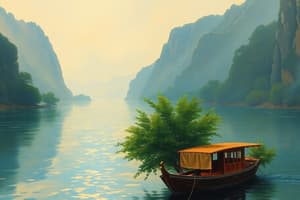Podcast
Questions and Answers
What typically symbolizes the beginning of a river?
What typically symbolizes the beginning of a river?
- An ocean inlet
- A mountain spring (correct)
- A large lake
- A flat plain
Which characteristic is NOT associated with the upper course of a river?
Which characteristic is NOT associated with the upper course of a river?
- High elevation
- Calm water flow (correct)
- Presence of rapids
- Waterfalls
What type of plants are referred to as emergents?
What type of plants are referred to as emergents?
- Plants that float on the water's surface
- Plants that thrive in dry conditions
- Plants submerged underwater
- Plants that grow along the river banks (correct)
What defines the lower course of a river?
What defines the lower course of a river?
Which of the following is an aquatic plant that can be found in still waters?
Which of the following is an aquatic plant that can be found in still waters?
What role do bacteria and protozoa play in the river ecosystem?
What role do bacteria and protozoa play in the river ecosystem?
Which of the following animals are considered riverine predators?
Which of the following animals are considered riverine predators?
How does energy flow through the food chain in rivers and streams?
How does energy flow through the food chain in rivers and streams?
Which of the following organisms does NOT typically live in or near the water of rivers and streams?
Which of the following organisms does NOT typically live in or near the water of rivers and streams?
What is the main source of energy for rivers and streams?
What is the main source of energy for rivers and streams?
Flashcards are hidden until you start studying
Study Notes
Sources of Rivers and Streams
- Freshwater bodies include rivers, streams, creeks, brooks, runoff, and arroyos, distinguished by size and environment.
- Rivers originate from small water sources, commonly found in mountains or hills, influenced by gravity as water flows downhill.
- Sources may include rainfall, melted snow from glaciers, mountain lakes, or streams.
- Springs, another form of water source, occur when groundwater flows to the surface due to saturation from rain or melted snow.
Courses of Rivers
- Rivers flow through three main courses: upper, middle, and lower.
- The upper course is marked by swift waters, rapids, and waterfalls, typically located in mountainous regions.
- The middle course features twisting, meandering waters that flow rapidly across the landscape.
- The lower course, closer to the ocean, has flatter land with slower-moving waters.
Flora and Fauna Around Rivers
- Vegetation along riverbanks includes plants like pickerelweed, cottonwoods, oaks, elms, and maples.
- Emergent plants, such as broadleaf arrowhead and soft rush, grow along the water's edge.
- Floating-leaved plants include spatter dock and duckweed, often found in calm waters of ponds and backwaters.
Animal Life in Rivers and Streams
- Insects such as water striders and dragonflies inhabit the water surface, with fish targeting mosquito larvae.
- Diverse fauna includes frogs, beavers, muskrats, river otters, and birds like Green Herons along riverbanks.
- Terrestrial animals like deer, elk, wolves, rabbits, and raccoons may visit riverbanks but do not reside in the water.
- Reptiles, including snapping turtles, are common in the aquatic environment.
Ecosystem Dynamics
- Bacteria, protozoa, and fungi decompose organic matter, returning nutrients to the ecosystem.
- This decomposition supports a food chain starting with primary producers (aquatic plants) which harness solar energy to produce food.
- Energy flows from producers to consumers, showcasing the interconnectedness of life in and around rivers and streams.
Studying That Suits You
Use AI to generate personalized quizzes and flashcards to suit your learning preferences.




